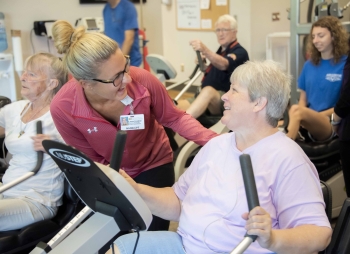 Regular exercise, proper nutrition, and stress management are the foundation
of good health for everyone. But, as Pat Benfield RN, MA, FAACVPR of Catawba
Valley Medical Center’s
Cardiopulmonary Rehabilitation Center explains, “For people who have experienced cardiac events or procedures,
these lifestyle factors are key to recovery and preventing another, perhaps
more serious, heart event.”
Regular exercise, proper nutrition, and stress management are the foundation
of good health for everyone. But, as Pat Benfield RN, MA, FAACVPR of Catawba
Valley Medical Center’s
Cardiopulmonary Rehabilitation Center explains, “For people who have experienced cardiac events or procedures,
these lifestyle factors are key to recovery and preventing another, perhaps
more serious, heart event.”
What is Cardiac Rehabilitation?
“After a patient undergoes a cardiac procedure or experiences a cardiac
event, such as a heart attack, they are encouraged to attend a cardiac
rehabilitation (rehab) program, like the one here at Catawba Valley Medical
Center,” says Pat.
Cardiac rehab is a wholistic program designed to help you strengthen your
heart while reducing the likelihood of another heart event by using an
interdisciplinary approach to recovery. “Our program serves as a
sort of ‘one-stop-shop’ for patients,” explains Pat.
“It’s not about improving your health in one specific area—it’s
about teaching new behaviors and improving your overall health. Our program
encompasses exercise, education and counseling to help reduce those risk
factors that can be changed.”
How It Effectively Helps Patients Recover From & Prevent Future Heart Events:
1. Lower your risk of a second cardiac event. According to the American
Heart Association, it will reduce the likelihood of being readmitted to
the hospital by
25 percent.
2. Receive a personalized treatment plan.
“During the first few weeks of rehab you will receive a treatment
plan that is individually tailored to fit your specific needs,”says
Pat. “Our team will work closely with you as you progress through
the program, monitoring your heart rate and blood pressure to evaluate
and address possible areas of concern or improvement.”
3. Regain your energy and strength.
“Exercise is a vital component of cardiac rehab,” says Pat.
“Structured exercise helps with the mental and physical consequences
of cardiac and pulmonary illness. Patients often exhibit a level of fear,
depression and anxiety regarding physical activity after a heart event
or procedure. By providing structured exercise in a monitored setting,
we’re able to alleviate their concerns and get them back to the
daily activities they enjoy while also helping them embrace a more active
lifestyle to cut the future risk of another heart event.”
4. Get the support of others who are experiencing or have experienced some
of the same challenges.
“Yes, even though each patient’s program is personalized to
them, exercise is done in a group setting,” explains Pat. “No
one is required or expected to socialize, but our patients seem to inevitably
form bonds which help keep each other accountable and motivated.”
5. Build healthier habits.
“After a patient completes our program, we want to be sure their
equipped with all the tools necessary to live a heart-healthy lifestyle,”
says Pat.“They’ll master the fundamentals of how to eat a
heart-healthy diet from a registered dietician, receive education about
their condition, learn how to best keep up with medical therapies and
manage other cardiovascular risk factors, and work with a licensed counselor
learning techniques on how to reduce stress.”
Although evidence shows participating in a cardiac rehab program substantially
lowers the risk of dying from another heart event and improves a patient’s
quality of life, some patients who qualify for the program don’t
participate. Make the time and effort for optimal recovery after a cardiac
event by contacting Catawba Valley Medical Center’s
Cardiopulmonary Rehabilitation Center. Our staff will be happy to consult with you about your individual risk
factor profile and cardiac health. Please call 828.326.2131 or learn more
about cardiac rehab and our comprehensive cardiology services
on our website.